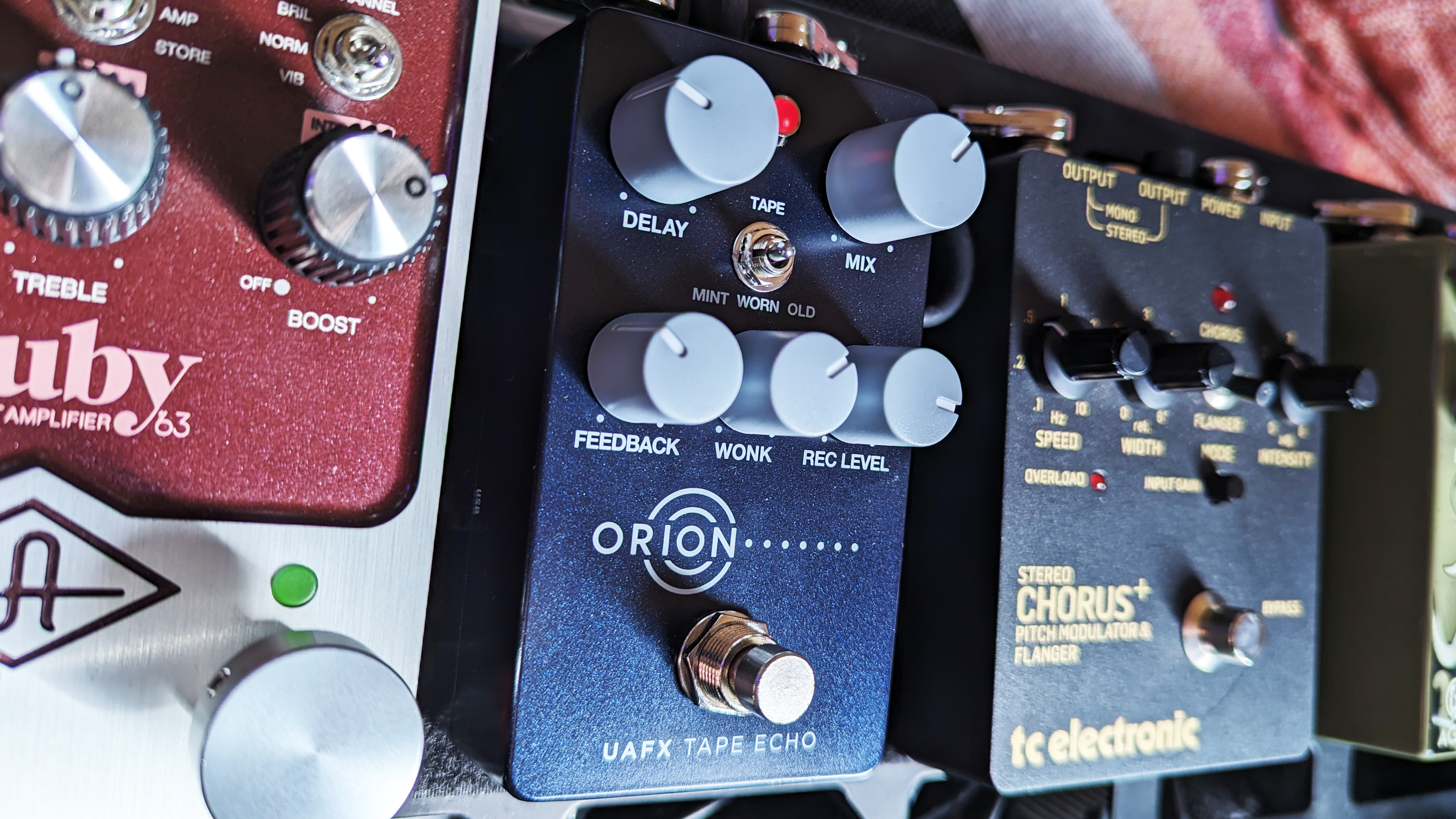MusicRadar Verdict
The Orion is a top-tier emulation of the EP-3 and its always-on preamp option should not be overlooked as an attractive and useful part of the deal. It delivers what it promises from a company at the forefront of modelling classic vintage hardware.
Pros
- +
The best pedal Echoplex EP-3 emulation we've heard
- +
The level of control impresses Vs the competition
- +
You can use the preamp as an always-on tone booster
Cons
- -
Sounds matter most but it doesn't look like a $220 pedal
- -
The Starlight is a better deal if you need more delay types
MusicRadar's got your back
Universal Audio UAFX Orion Tape Echo Delay pedal: What is it?
Of all the pedals in the first series of UAFX compact pedals, the Orion has the most direct competition on price and features. The solid-state Maestro EP-3 Echoplex that emerged in 1970 is the definitive delay for many players – not surprising considering it was showcased by Eddie Van Halen, Joe Walsh, Brian May, Jimmy Page, Andy Summers and David Gilmour. Even less surprising is the popularity of pedal emulations of this tape delay; Dunlop, Catalinbread, Gurus and Lovepedal are all in the mix with strong options. But not all offer all the EP-3's charms in one package.
The EP-3's tube-driven preamp is so appealing that Xotic, Dunlop and Catalinbread make separate pedals focussed on emulating it as a clean boost. Not bad for a preamp that wasn't tube-based like its two forbears.
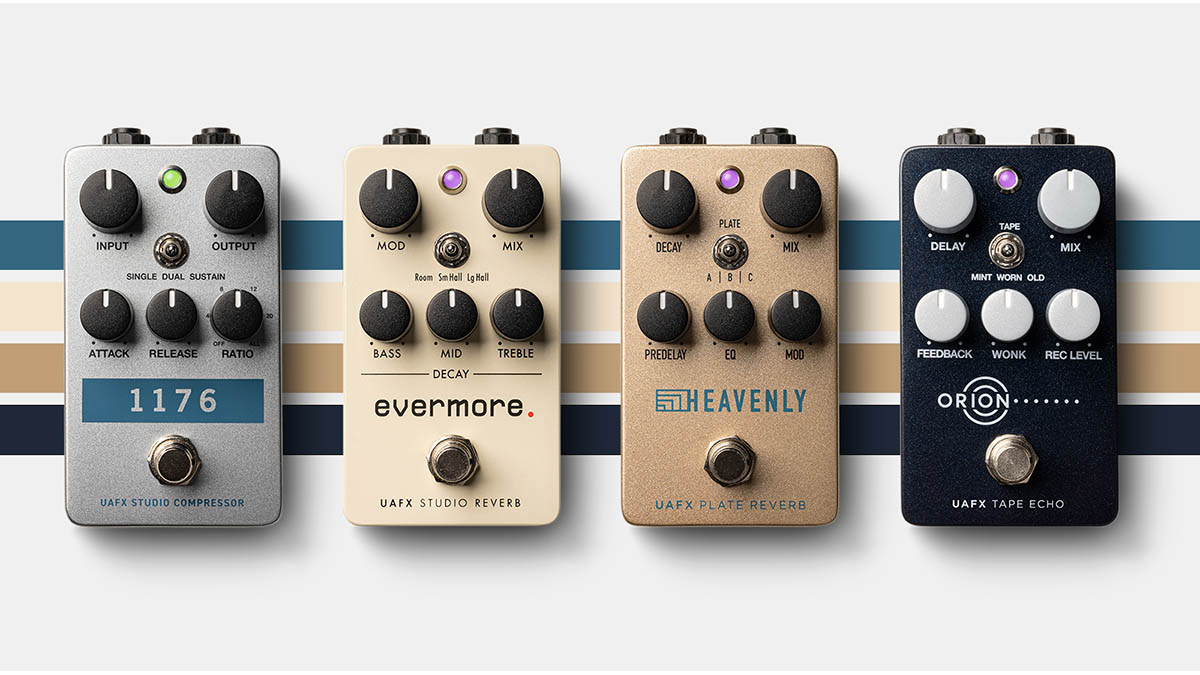
Universal Audio UAFX Orion Tape Echo Delay pedal: Performance and verdict
In the sunlight what initially seems to be a black metal casing reveals a blue sparkle – like starlight. Nice touch but there's no getting around the feeling the Orion, and the other compact pedals in UA's first wave, look pretty… utilitarian. They don't exactly say 'premium' to look at while stamping their identity like the bigger UAFX stompboxes. Though they have the same rugged plastic jack socket nuts as them, and matte control knobs as the second series of the larger UAFX effects. It's certainly not at the top of the effects pedal priority list, but visual appeal is a thing, and clearly many brands take it seriously for a reason and at this price-point, looks feel like they matter more.
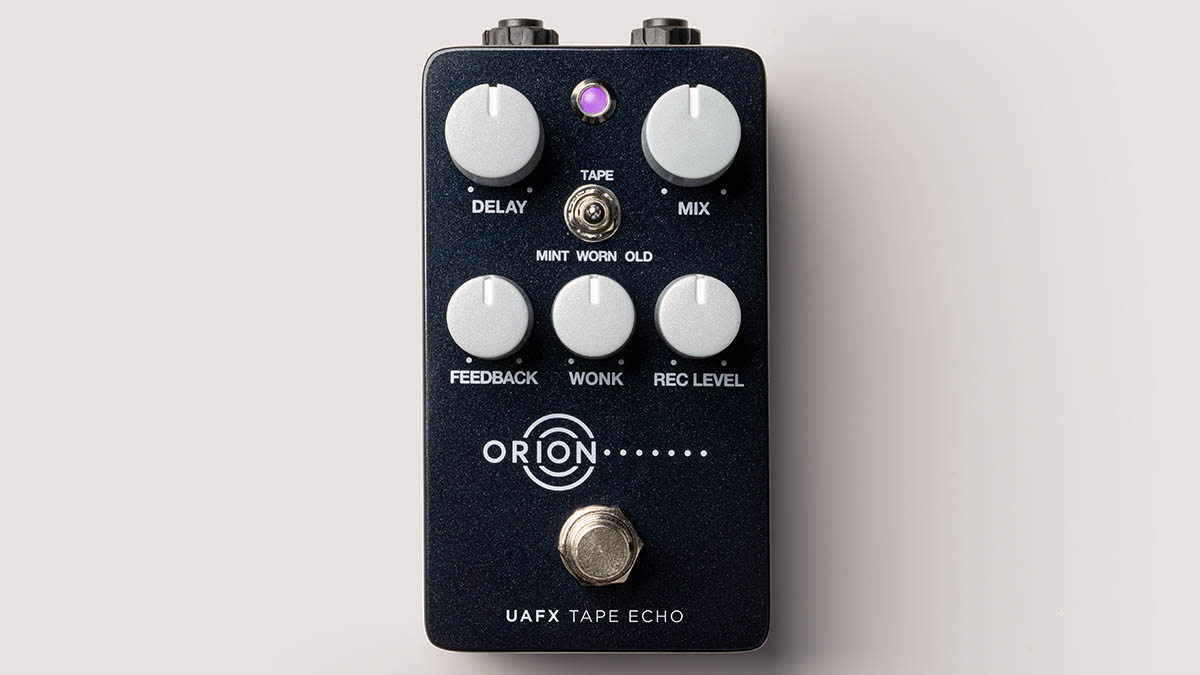
But when it comes to sounds, there are no question marks here. Unlike the EP-3 sounds in the UAFX Del-Verb pedal, the emulation of the original unit's preamp stage isn't just included here, but you can switch it on and off at the rear of the pedal. This is quite a selling point.
The gain and compression it adds make for a great tone fattener and clean headroom boost. In Trails mode (also switchable at the back) you can benefit from this preamp emulation even when the pedal is off. Hey presto; an always-on tone enhancer that I'd never want to turn off anyway. But of course, there's much more available here, but this is a real plus for the Orion's usability and value proposition in my opinion.
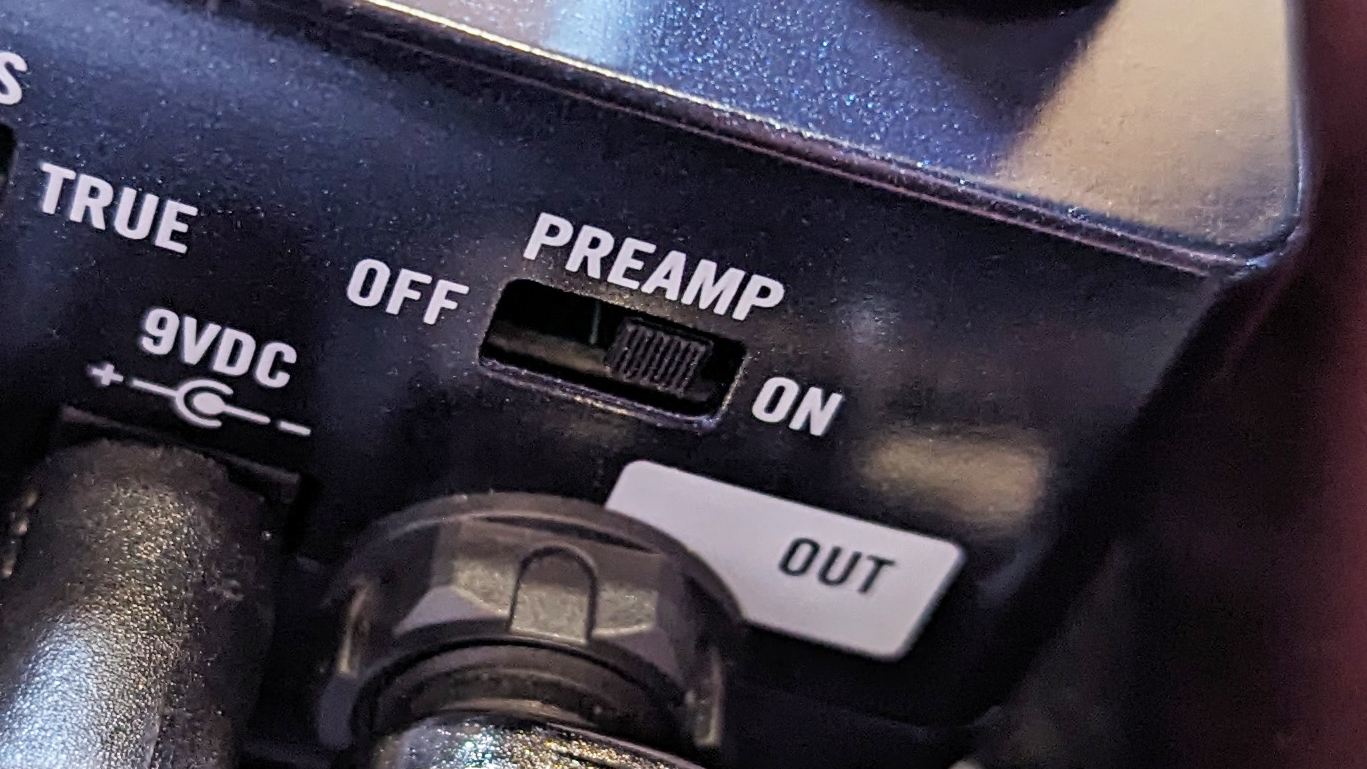
In terms of controls here, Delay sets length of the tape echo rate (80-700 milliseconds), Mix sets the dry / wet with full being 100% wet delay, Feedback is the number of repeats… so far so familiar. Then WONK, undoubtedly my favorite parameter name of 2023 so I'm putting it in bold caps, dials in modulation and tape splice sounds. This has much more impact on the Old and Worn tape age modes compared to the Mint.
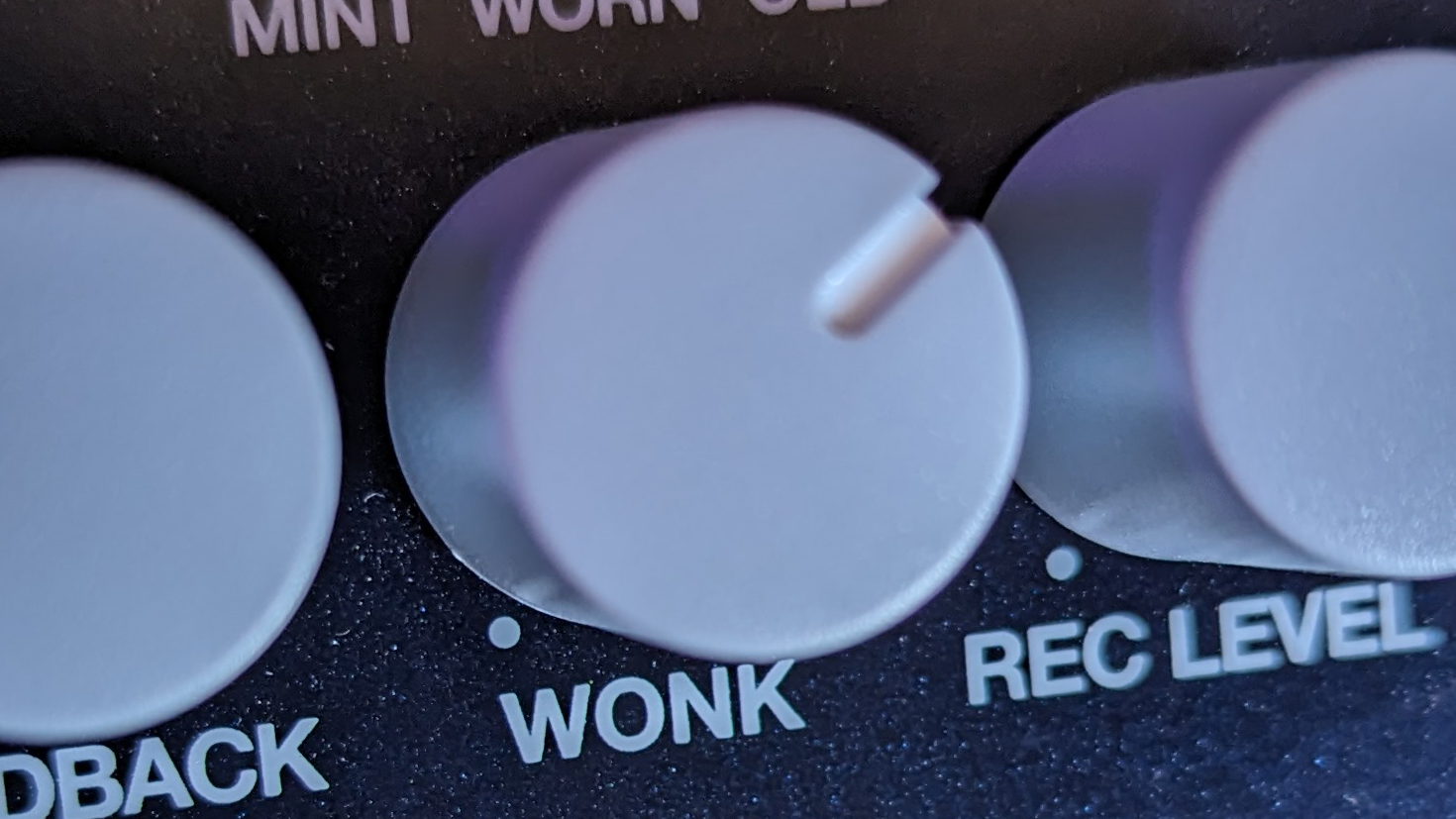
These three modes are adjustable via a mini toggle switch and move from new old stock with 'snappy' compression to 'gently used' early '70s but with no commander compression circuit to a mid-'70s tape machine with worn tape and 'warbly, chorus-like' repeats. They very much live up to those descriptions in practice too.
Want all the hottest music and gear news, reviews, deals, features and more, direct to your inbox? Sign up here.
Superb vintage rockabilly slapback and gritty atmospherics for longer delay times sound especially grand with single-coil Strat chime
After all that, Record Level is akin to a delay level, rather than a mix – it is how hot your input signal to recorded to the virtual tape, distorting at higher levels.
There's much to explore in all this, just as there was on the Starlight Echo Station where these sounds can also be found. Superb vintage rockabilly slapback and gritty atmospherics for longer delay times sound especially grand with single-coil Strat chime. You don't get the advantage of the Starlight's – admittedly pretty miserly – single preset slot so you'll need to dial in sounds as required between songs, but it's user-friendly enough for that and you'll get to know your sweet spots.
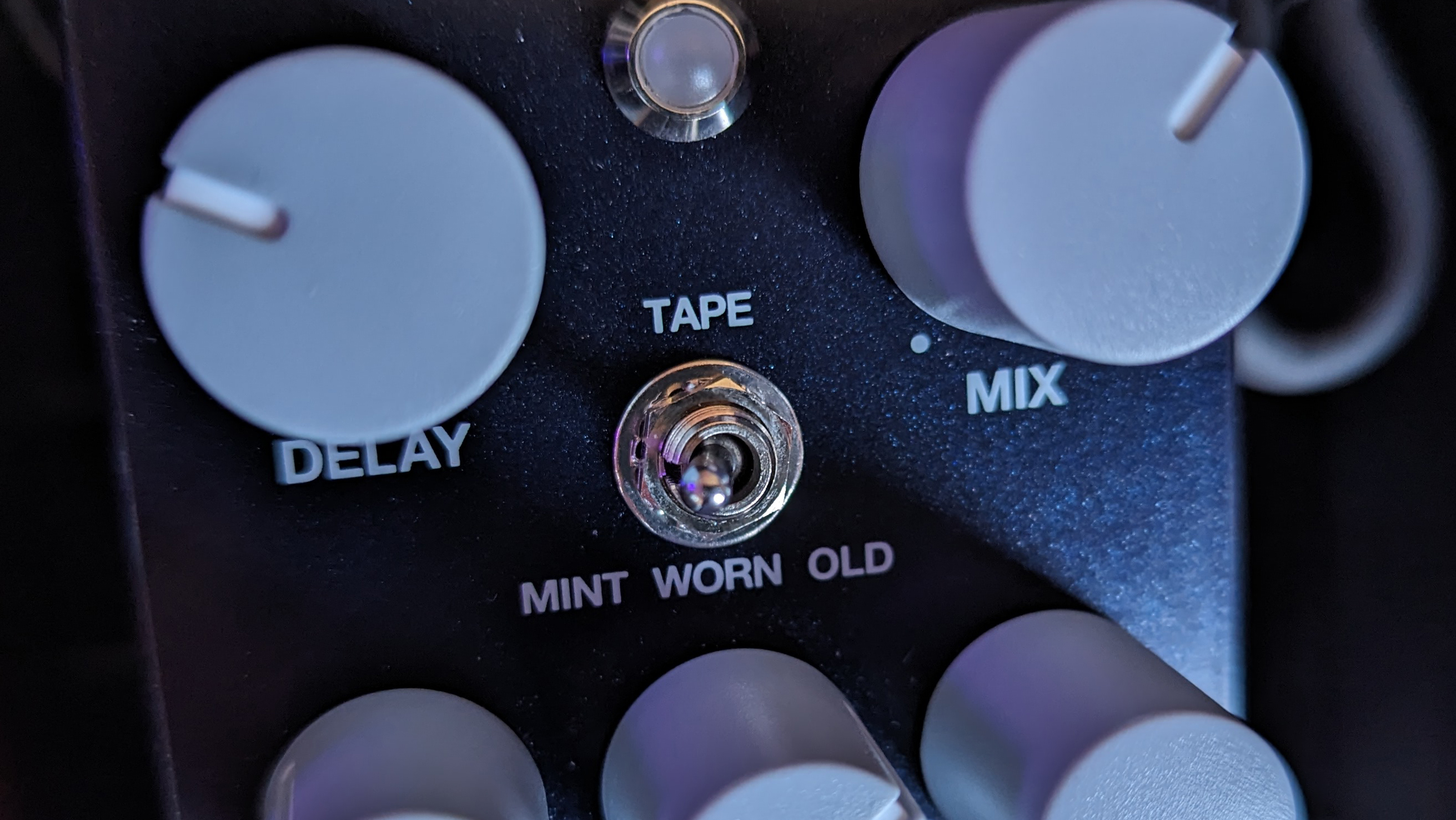
It's an especially addictive pedal for lead work where it just blends under the notes so well – adding character and warmth, or really skewing things with the Old / Wonk combo ramped up. After the delay and feedback are set low you can also get some cool modulation-only tones with the Record Level adding the gain.
If your delay needs require more scope, the UA's Starlight Echo Station offers the same package with excellent Bucket Brigade Memory Man-esque and digital delay sounds, while the Del-Verb throws in those alongside reverb, but doesn't have the same level of control (or preamp mode). They're $399 and $349, respectively so consider your needs and you could end up with a better deal in the longer term. As it stands in the context its competition though, I really feel the quality of the Orion is acceptably priced for the features it offers as an EP-3 emulation with this level of control.
MusicRadar verdict: The Orion is a top-tier emulation of the EP-III and its always-on preamp option should not be overlooked as an attractive and useful part of the deal. It delivers what it promises from a company at the forefront of modelling classic vintage hardware.
Universal Audio UAFX Orion Tape Echo Delay pedal: Hands-on demos
Pedal Of The Day
Chords Of Orion
Mark Johnston
Rabea Massaad
Andertons
Universal Audio UAFX Evermore Studio Reverb pedal: Specifications

- TYPE: Pedal emulation of Maestro Echoplex EP-3 solid-state tape delay
- CONTROLS: Delay, Mix, Mint / Worn / Old tape age mode mini toggle switch, Feedback, Wonk, Record Level bypass footswitch, Trails / True bypass switch, Preamp on / off switch
- POWER: 9V DC pedalboard isolated power supply (250mA power draw)
- CONTACT: Universal Audio

Rob is the Reviews Editor for GuitarWorld.com and MusicRadar guitars, so spends most of his waking hours (and beyond) thinking about and trying the latest gear while making sure our reviews team is giving you thorough and honest tests of it. He's worked for guitar mags and sites as a writer and editor for nearly 20 years but still winces at the thought of restringing anything with a Floyd Rose.
